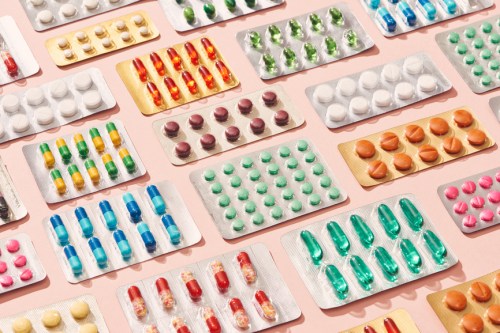Terms like “medication safety” and “toxic substance precautions” probably call to mind scientists in lab coats and goggles, diligently peering into microscopes in a sterile, clinical setting. And while you’re not wrong, if you take any medications in your daily life, there’s another more familiar place you’ll want to keep these types of medication rules in mind—your own home.
Experts in This Article
Medication safety is important for everyone to follow—not just pharmacists, according to Robert Alesiani, PharmD, BCGP, chief pharmacotherapy officer at Tabula Rasa HealthCare, who has worked at community and institutional pharmacies in his 35-year career. When in doubt, ask your healthcare provider or pharmacist the best way to store or take your medications to avoid any potential problems. Even better? Anyone can walk into their local pharmacy to speak with a pharmacist about their medications—no panicked phone call to the doctor is required. That said, Dr. Alesiani does have a few medication rules to consider.
1. Just because something is over the counter doesn’t automatically make it safe for you
While all non-prescription drugs, also called over-the-counter medication, are deemed safe and effective by the U.S. Food and Drug Administration, their protocols—which ensure that medications are made with certain ingredients and do what they say they do—don’t take into account your personal health situation. For example, some people may have allergies to ingredients in OTC medications, or they might be taking prescribed medications that could interact with an OTC medication. Case in point: Some OTC cough medications can interact with certain antidepressants.
For those reasons, Dr. Alesiani says it’s always best to be cautious when taking new OTC medications. “Never assume a medication available without a prescription is necessarily always safe,” he says. Instead, check in with your doctor, a trusted provider, or a pharmacist to see if there are any potential issues with taking a certain OTC medication—and whether there are better alternatives for you.
“Ironically, the bathroom medicine cabinet and the refrigerator are two of the worst places to store medications.”—Robert Alesiani, PharmD, BCGP, chief pharmacotherapy officer at Tabula Rasa HealthCare.
2. Make sure to store your meds in the proper place
“Unless indicated otherwise, medications should be stored at room temperature, low humidity in a spot where they will be out of reach of children and pets,” says Dr. Alesiani. “A shelf within a closed kitchen cabinet, away from the stove (heat) and sink (humidity), is best,” he says.
Sometimes it can be easier to put medication in a pillbox, but it’s still important to keep all the prescribing information handy. For example, if you like to dole out all your medications into a weekly pill organizer, take a photo of the pill bottle before you dispose of it so that you have the date it was filled, expiration date, dosage amount and quantity, along with any other pertinent info—should you need it.
Where you think you should be storing your medication and where you should actually store it may be a bit of a surprise, too. “Ironically, the bathroom medicine cabinet and the refrigerator are two of the worst places to store medications, as both locations expose the bottles to extremes of humidity and temperature, which can cause premature breakdown and reduced potency of many medications,” says Dr. Alesiani.
3. Be wary of friendly advice from loved ones
Nobody likes to talk more about their personal health experiences than someone who finds out you’re taking the same medication. And while hearing others’ personal stories about how a medication worked for them is fine, take the information with a grain of salt.
“Everyone is different. People should not anticipate success or failure of any therapy based on what may have occurred after a neighbor, cousin, or friend’s experience with the same medication,” says Dr. Alesiani. There are a lot of nuances about medicines, including side effects, interactions with other medications you might be taking, and your individual makeup and health that won’t translate to someone else’s experience. So, if your neighbor says you shouldn’t bother taking a certain medicine because it made them super sick or bloated—politely nod and go about your day.
If you aren’t sure why you haven’t been prescribed a medication, it’s best to bring it up with a trusted provider. Dr. Alesiani sees this frequently when it comes to antibiotics. Here’s the scenario: A well-meaning loved one suggests you get an antibiotic for a head cold, but your doctor refuses to prescribe it. “It can be frustrating to disagree with your doctors, but the prescriber could have come to the conclusion that the head cold is viral and an antibiotic wouldn’t be helpful, and in fact, may be harmful,” says Dr. Alesiani.
4. Don’t put too much stock into marketing terms like “natural,” “herbal,” and “clean”
“Natural” and “clean” are adjectives primarily used in marketing, with little to no evidence when it comes to medicine. “‘Natural’ products are not necessarily healthier, safer, or more effective than the same drug, vitamin, or other supplement produced in a lab. For instance, several studies of the herb, Echinacea, have not provided any evidence of benefit against the common cold, yet many advocate and take it for that indication,” says Dr. Alesiani. On the flip side, natural, herbal, and plant-based supplements do have medicinal properties that need to be treated with caution and care. There is such a thing as having too much of a supplement even though it says it’s “natural” on the box.
These types of “natural” medications can also interact with prescription and OTC medications, so it’s always best to speak to your pharmacist or care provider for help with these products prior to taking them.
5. Pay close attention to the instructions on how to take your medication
Things can get a little tricky when you have to take multiple medications every day. “Let’s say you take five medications a day, and all have the same instructions, ‘take1 tablet by mouth daily,’ what does that mean? Should you take all five at the same time, first thing in the morning? Maybe. Should you take each at a different time throughout the day? Probably not,” says Dr. Alesiani.
That’s because certain medications have specific nuances, he explains. Some might be absorbed better with food, while others may cause drowsiness or extra stimulation, or may even be metabolized by the same enzyme. If the latter is the case, you may want to space your dosage out to ensure your medications work properly.
Pharmacists are uniquely equipped to handle these types of medication questions. So, you can consider your local pharmacist a free resource for all your daily medication planning needs—and who knows, they may even have a few medication rules of their own to impart.
Sign Up for Our Daily Newsletter
Get all the latest in wellness, trends, food, fitness, beauty, and more delivered right to your inbox.
Got it, you've been added to our email list.











